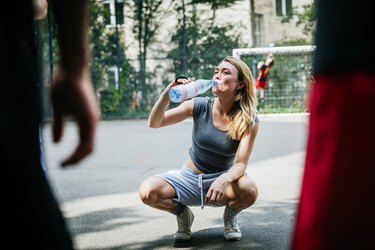
If your stomach hurts after drinking water, it can be a little concerning. After all, isn't water good for you? Just like with anything else in life, too much water can be a bad thing. Overhydration can cause several problems, including stomach irritation.
Tip
Yes, drinking too much water can irritate the stomach and lead to other symptoms. If you regularly experience a stomach ache after drinking water, see a doctor.
Video of the Day
Stomach Hurts After Drinking Water?
Do you experience stomach pain after drinking water? If you drink the water after your meal, there's still food in your stomach. The water fills your stomach even more, adding pressure and triggering the production of more stomach acid as part of the digestion process. This can contribute to heartburn. The stomach begins to create acid to aid in digestion when its volume increases, whether or not that volume is from food or liquid.
Video of the Day
Because water doesn't have nutritional components to break down for digestion, the rate of gastric emptying is much faster than a meal of solid food. While this means any discomfort caused by drinking water should be short-lived, it's important to note that gastric emptying varies from person to person and from meal to meal.
A July 2014 study published in the Journal of Neurogastroenterology and Motility found that gender, menstrual status and smoking status affect solid gastric emptying. Men who smoke emptied faster than non-smokers and in general men emptied faster than women. Women in the luteal phase of menstruation emptied slower than those in follicular or menopausal stages. Age, body mass index and alcohol consumption did not influence gastric emptying rate.
Daily Recommended Water Intake
The Centers for Disease Control and Prevention (CDC) say that while there are no recommendations for how much plain water people should drink every day, there are recommendations for daily total water intake. The daily fluid intake refers to water consumed from food, drinking water and other liquids. The amount varies based on a variety of factors such as age, gender, pregnancy and breastfeeding status.
According to those recommendations from the National Academies of Sciences, Engineering, and Medicine, the adequate daily fluid intake for a healthy adult living in a temperate climate is 11.5 cups (2.7 liters) per day for women and 15.5 cups (3.7 liters) for men, with about 20 percent of the daily fluid intake coming from food.
Drinking too much at once can also cause stomach pain after drinking water. If you're behind on the day's intake, it may be tempting to drink a lot in one sitting. You should know; however, that there are risks associated with drinking so much water all at once.
Dangers of High Water Intake
Drinking too much water can lead to water intoxication, also known as hyponatremia. According to the Merck Manual, hyponatremia happens when the body has too little sodium in the blood. The excess fluid must go into the cells, which causes them to swell. The swelling can cause confusion and fatigue in mild cases. In more severe situations, it may lead to seizures, coma or death.
To avoid water intoxication, only drink small amounts of water throughout the day and when you feel thirsty. The human body can only process a certain amount of water every hour. Drinking more than the body can handle may cause a number of problems, especially in those with kidney disorders, according to the National Kidney Foundation (NKF).
- Journal of Neurogastroenterology and Motility: "Normal Solid Gastric Emptying Values Measured by Scintigraphy Using Asian-style Meal:A Multicenter Study in Healthy Volunteers"
- Centers for Disease Control and Prevention: "Get the Facts: Drinking Water and Intake"
- National Academies of Sciences, Engineering, and Medicine: "Dietary Reference Intakes:
- Merck Manual: "Hyponatremia (Low Level of Sodium in the Blood)"
- National Kidney Foundation: "6 Tips To Be “Water Wise” for Healthy Kidneys"